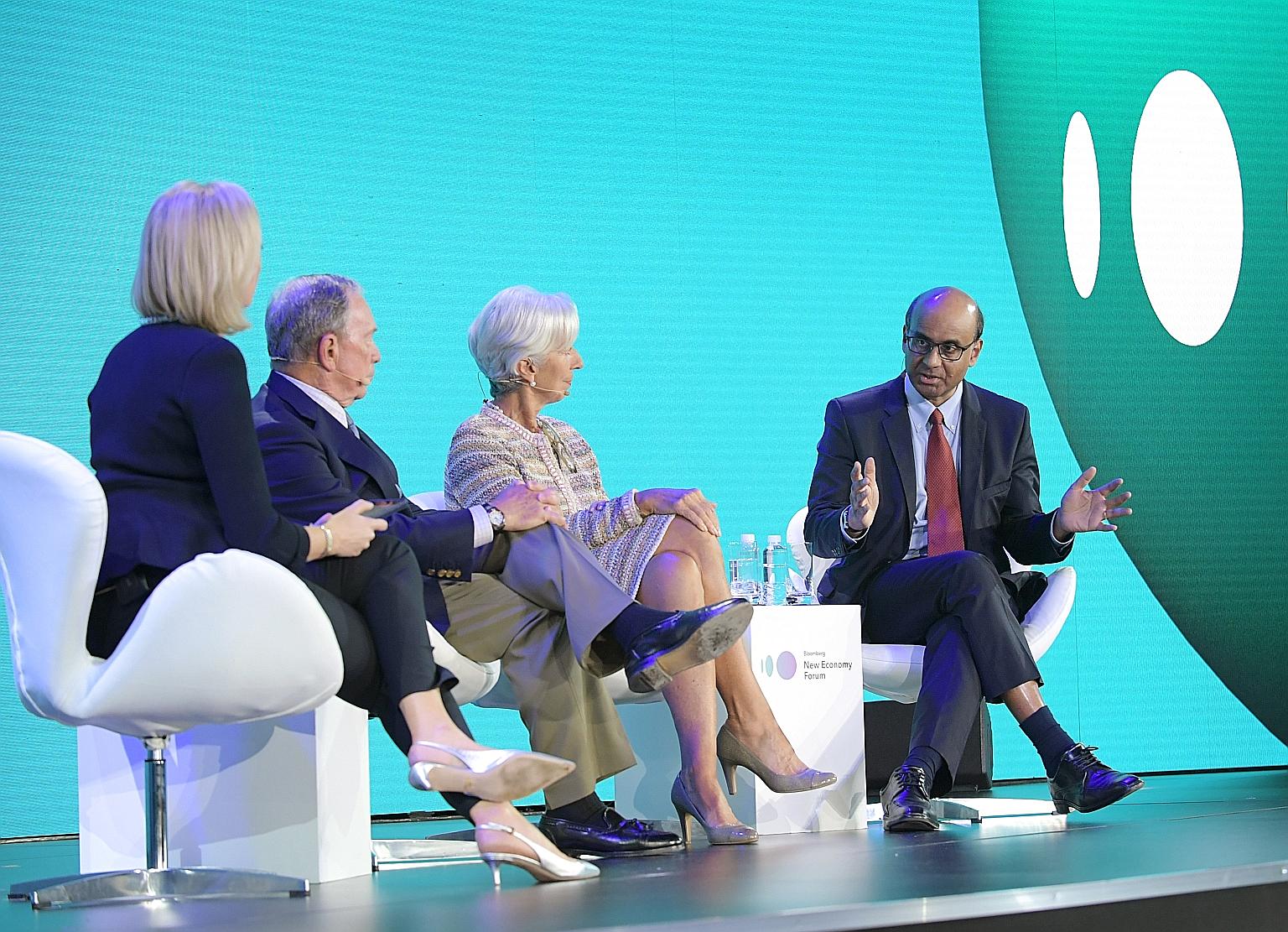Tharman flags pressing issues facing advanced economies
Global leaders call for reforms in healthcare and pension systems
Sign up now: Get ST's newsletters delivered to your inbox

Deputy Prime Minister Tharman Shanmugaratnam sharing his views at a panel discussion on Wednesday at the Bloomberg New Economy Forum. With him are (from left) moderator and Bloomberg TV editor-at-large Francine Lacqua, former New York mayor Michael Bloomberg, and IMF managing director Christine Lagarde.
ST PHOTO: ALPHONSUS CHERN
Young people are frightened of the future because they are unsure about jobs and worried that they will have to foot the healthcare bill of the elderly, Deputy Prime Minister Tharman Shanmugaratnam said yesterday.
These uncertainties are among the most pressing problems facing the world, but there is a lack of political will today to tackle these issues, he said during a panel discussion on 2019 global outlook.
Fellow panellists Christine Lagarde, managing director of the International Monetary Fund (IMF), and former New York mayor Michael Bloomberg also pointed out that as countries face technological disruption, it is critical for governments to ensure that people have the skills to take on the jobs of the future.
It is also important that advanced economies, whose demographics are rapidly ageing, reform their pensions and healthcare financing systems to ensure today's young people do not end up being over-burdened by the taxes needed to fund healthcare in the future, the three global leaders added at the inaugural Bloomberg New Economy Forum, held at the Capella Singapore.
Mr Tharman said that "across the advanced world, the very broad middle of society is seeing very little improvement in their lives".
And young people worry that "there is no sustainable solution today for pensions and healthcare financing and they are going to have to foot the bill".
Citing Germany, he said that in less than 20 years, there will be one working adult for every retiree and the worker will have to contribute about half of his monthly salary into the pensions and healthcare financing system.
"The (average worker) does not know it yet, but the arithmetic is very clear," he added.
The fact that this issue is "not part of the political narrative today" is even more worrying, he said, because it means the world faces a major threat down the road when these problems become bigger.
"It will change when things get much worse - that's unfortunately the way things work," Mr Tharman said.
Mr Bloomberg, founder of Bloomberg LP, the parent firm of Bloomberg Media Group which organised the forum, agreed, saying one of the greatest challenges of the future is ensuring meaningful jobs for people in the face of technological disruption.
Technology has made life better for many, but it has also displaced many workers from their jobs, he said. "The great challenge is not income inequality - all you have to do is tax the rich and give the money to the poor - it's how do you create jobs for people who want the dignity of coming home and saying, 'I contributed something'," he said.
Ms Lagarde noted this is a pressing issue, as there will be about 40 million young people entering the workforce in the next 10 years.
While there will not be an overall reduction in the number of jobs, there will be a transition period for people whose skills become obsolete, she said. The answer, she added, is preparing students and working adults through education. "It does not necessarily mean computer coding. We will need skills that are diverse and varied."
Mr Tharman agreed, adding: "In this new game, we need a lot more collaboration, industry by industry, working with social partners or unions and working with the government, especially local governments."
The three panellists also gave their views on the trade war being waged by the United States against some of its major trading partners, especially China. The US-China trade war would likely be the biggest news story in the coming year, said 68 per cent of the audience, who were polled at the start of the panel discussion.
Mr Tharman said: "The biggest problem on my mind is the difficulties that are underpinning the trade war, which make it more likely that we'll continue to see trade frictions for a long time.'' These are the domestic difficulties confronting the countries involved, he added.
Mr Bloomberg believed that eventually, the US and China "will get back to some normal kind of trade, but with a bit more acrimony".
Ms Lagarde said the trade war may get worse before it gets better. Her reason is that the usual channels world leaders typically use to resolve such disputes cannot be used today. These channels, she added, "are not conducive to the show that is designed by (US President Donald) Trump".


